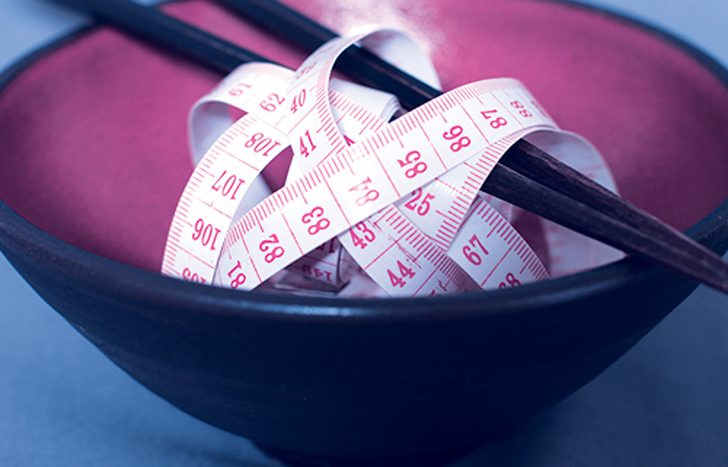 The world is getting fatter, and Japan–though still enviably slim in comparison to other developed nations–is no exception. As the nation’s waistlines expand, so do health risks. According to the World Health Organisation, a startling 27 percent of Japanese men, and 19 percent of Japanese women, are overweight, with a Body Mass Index (BMI) of 25 or higher, an indicator of increased risk of developing a familiar but no less frightening list of weight-related diseases: type 2 diabetes, heart disease, stroke, hypertension, osteoarthritis, and a number of cancers. In Japan, waist size—85 centimetres and above for men, and 90 centimetres or more for women–is the key diagnostic indicator for “Metabolic Syndrome,” the name used by the Japanese government for the country’s growing girth crisis.
The world is getting fatter, and Japan–though still enviably slim in comparison to other developed nations–is no exception. As the nation’s waistlines expand, so do health risks. According to the World Health Organisation, a startling 27 percent of Japanese men, and 19 percent of Japanese women, are overweight, with a Body Mass Index (BMI) of 25 or higher, an indicator of increased risk of developing a familiar but no less frightening list of weight-related diseases: type 2 diabetes, heart disease, stroke, hypertension, osteoarthritis, and a number of cancers. In Japan, waist size—85 centimetres and above for men, and 90 centimetres or more for women–is the key diagnostic indicator for “Metabolic Syndrome,” the name used by the Japanese government for the country’s growing girth crisis.
To ease the strain on Japan’s comprehensive health care system, already taxed by a rapidly aging population, the government has introduced policy aimed to stem this trend: annual government and corporate health checks now measure waist size, and employers have been mandated to distribute weight-loss literature to their workers. The number of employees in Japan with metabolic syndrome (called “metabo” or “metaboli”) must be decreased by 10 percent by 2012, with fines for employers failing to meet this target.
According to a New York Times article, electronics giant NEC, for example, could face fines equal to 19 million dollars. Revenue generated by such fines is expected to provide cash relief for the struggling health care system.
Though the foreign press has highlighted the controversy of the situation—is health a right or an obligation? Does the government have any place, as it were, at the tables of the nation? The vast majority of Japanese have undergone their health checks as usual, and life, on the whole, remains normal, aside from employers now reminding their employees to take the stairs.
What has changed, however, is the world outside the workplace. Almost immediately following the implementation of the policy, it seems, commercials for low-calorie versions of men’s favourite’s–curry, mayonnaise, beer–hit the airwaves, apparently targeting the overwhelmingly male workforce. A television advertisement for lowfat curry showed a pretty, young woman stirring a simmering a traditional Japanese roux-based curry on the stove, preparing dinner with obvious marital devotion. Meeting her husband at the door, she flirtatiously squeezes his midriff.
The scene cuts to the reduced calorie curry package. Low-calorie, low-carbohydrate, and low-sugar beers hit the most prominent shelves at supermarkets and convenience stores.
According to a recent Nikkei survey, over half of married men in dual income households cook less than one meal a week. Though things are changing, the kitchen still tends to be the domain of the woman, so essentially, the buck stops with their wives–many with jobs of their own, in addition to the responsibilities of housework and childcare.
 Reiko Tanaka* is slim, energetic, and looks younger than her 41 years. “Some of my friends, whose husbands have been asked by their employer to lose weight, feel that it’s really up to them to look after their husbands’ weight themselves by preparing diet and healthy foods,” she tells me. “It’s hard on them.”
Reiko Tanaka* is slim, energetic, and looks younger than her 41 years. “Some of my friends, whose husbands have been asked by their employer to lose weight, feel that it’s really up to them to look after their husbands’ weight themselves by preparing diet and healthy foods,” she tells me. “It’s hard on them.”
Tanaka is a full-time homemaker—she left a career as an engineer over 12 years ago, just before the birth of their first child–and considers herself very fortunate that her husband has always shared in the grocery shopping and cooking. “It really depends on your husband,” she says. “My friends don’t have it so easy.”
Nevertheless, like her friends, she not only worries about ensuring a healthy diet for herself and her children, but is also concerned about her husband’s weight. Though the family eats together whenever possible, during peak seasons at the large company where her husband works, he often doesn’t get home until close to midnight, at which point he often prepares a large meal for himself before drifting off. Tanaka worries that this habit of eating so near bedtime is the main source of his growing girth. Obesity in Japan has been linked to dietary changes–more meat, more fast foods, and the prevalence of pre-made high-calorie meals in convenience stores–but changes in eating habits are also at fault. Whereas families once dined together on home-cooked meals high in vegetables and soy protein, working mothers now fill the table with convenient ready-made dishes, their time limited by their own jobs outside the home. Busy families, like Tanaka’s, often eat separately, relying on instant meals or grabbing a quick bowl of noodles at various times of the evening depending on schedules.
According to World Health Organisation statistics, daily intake of fruit and vegetables has dropped from an average of 193.5 grams in 1975 to a mere 119.2 grams in 2004, suggesting a move away from the traditional diet.
As more women enter the work force, the government is introducing family-friendly policies in an attempt to decrease the burden on those once infamously and unforgettably called “baby making machines,” by Health and Welfare Minister Hakuo Yanagisawa. “Flex time,” for example, allows workers to avoid late evenings by exchanging them with earlier mornings, so long as they observe the core noonday hours between 11 a.m. to 2 p.m. Unfortunately, the successful implementation of such policies is an uphill struggle, as many men are still unwilling to risk being seen as lacking in dedication, and possibly letting promotion pass them by.
Although the role of women has expanded rapidly in Japan, where the family structure has largely moved away from traditional, multi-generational households towards nuclear families in which mothers are more likely to work, men have been less flexible in the assumption of household duties. Tanaka echoes the UN statistics when she says that among her acquaintances, men are less likely to help with cooking, child-care, and household chores when the family lives in a multi-generational home. Although 53 percent of Japanese families were double income in 2005, women still averaged 4.26 hours of daily housework, compared to the 1.38 hours done by men.
Many unmarried career women point out that they are happier to be single than they would be in a marriage, where they feel they would have to shoulder the burden of housework in addition to their jobs. Of Tanaka’s friends, many of those who work full time “pick up groceries on the way home from the office, put the laundry on, cook dinner, and clean–somehow finding time to grab a bite to eat themselves”.
Economist Junya Tsutui, from the University of Nagoya, suggests that women’s reluctance to marry into this situation is a major factor in Japan’s plummeting birth-rates.
Although the government has implemented a work-life-balance program, hoping to reduce evening overtime and get men home earlier at night, Tanaka suggests that the root of the problem is much deeper, and lies in social norms. “My husband’s family runs a ryokan, so from the time he was a child he’s seen both parents cooking and shopping for groceries,” she says, “so he considers it normal for men and women both to cook.
Most people don’t learn that. If everybody did, then it would be easy. If everyone could have the situation I have, I think everyone would be happy.”
Until family friendly policies are actually enforced in all companies, the bulk of household responsibility–and the responsibility of metaboli–will continue to fall on the shoulders of women.
By handing the issue of obesity down the chain, it appears that the government may be overstraining a huge–though comparatively slim–sector of the workforce: the women.
Story by Skye Hohmann
From J SELECT Magazine, January 2009












-360x230.jpg)


Recent Comments